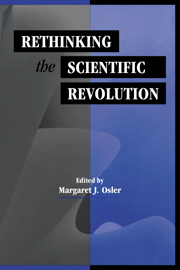Book contents
- Frontmatter
- Contents
- List of Contributors
- Preface
- Introduction
- Part I The Canon in Question
- Part II Canonical Disciplines Re-Formed
- Part III Canonical Figures Reconsidered
- 9 Pursuing Knowledge: Robert Boyle and Isaac Newton
- 10 The Alchemies of Robert Boyle and Isaac Newton: Alternate Approaches and Divergent Deployments
- 11 The Janus Faces of Science in the Seventeenth Century: Athanasius Kircher and Isaac Newton
- 12 The Nature of Newton's “Holy Alliance” between Science and Religion: From the Scientific Revolution to Newton (and Back Again)
- 13 The Fate of the Date: The Theology of Newton's Principia Revisited
- 14 Newton and Spinoza and the Bible Scholarship of the Day
- Part IV The Canon Constructed
- Index
11 - The Janus Faces of Science in the Seventeenth Century: Athanasius Kircher and Isaac Newton
Published online by Cambridge University Press: 25 October 2009
- Frontmatter
- Contents
- List of Contributors
- Preface
- Introduction
- Part I The Canon in Question
- Part II Canonical Disciplines Re-Formed
- Part III Canonical Figures Reconsidered
- 9 Pursuing Knowledge: Robert Boyle and Isaac Newton
- 10 The Alchemies of Robert Boyle and Isaac Newton: Alternate Approaches and Divergent Deployments
- 11 The Janus Faces of Science in the Seventeenth Century: Athanasius Kircher and Isaac Newton
- 12 The Nature of Newton's “Holy Alliance” between Science and Religion: From the Scientific Revolution to Newton (and Back Again)
- 13 The Fate of the Date: The Theology of Newton's Principia Revisited
- 14 Newton and Spinoza and the Bible Scholarship of the Day
- Part IV The Canon Constructed
- Index
Summary
Roberto still did not understand what Father Caspar Wanderdrossel was. A sage? That, certainly, or at least a scholar, a man curious about both natural and divine science. An eccentric? To be sure.
Umberto Eco, The Island of the Day BeforeDuring the second half of the seventeenth century two men in particular occupied a prominent place in the world of natural philosophy. Inhabiting respectively the capital cities of Rome and London, they had much in common. Both were deeply religious men, committed to the study of nature as a sure path toward the revelation of divine wisdom, who began their academic careers as professors of mathematics. Both valued the learning of the ancients, searching ever further into the pagan and Christian past in hope of illumination. For significant portions of their respective careers, that knowledge was found in the occult sciences. In all these respects, they typified the Christian encyclopedic approach to nature that humanists had practiced since the fifteenth century. They were quite probably, along with Leibniz, the last great humanist natural philosophers of the early modern period.
Despite these many similarities we do not usually place the German Jesuit Athanasius Kircher (1602–80) and the English philosopher Isaac Newton (1642–1727) side by side. For almost two centuries, they have inhabited the separate worlds created by modern histories of science and, to a lesser degree, articulated by intellectuals at the end of the seventeenth century who had begun to make these distinctions themselves.
- Type
- Chapter
- Information
- Rethinking the Scientific Revolution , pp. 221 - 246Publisher: Cambridge University PressPrint publication year: 2000
- 1
- Cited by

